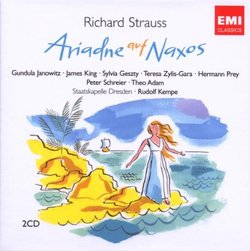A connoisseur's 'Ariadne' that falls a little short dramatic
Santa Fe Listener | Santa Fe, NM USA | 10/17/2008
(4 out of 5 stars)
"EMI's 1954 recording of Ariadne auf Naxos under Karajan was a miracle of style, and the female leads -- Schwarzkopf, Seefried, and Streich -- gave unsurpassed performances. But time passes, and the boxy mono sound in that set was dated almost before it was released. For a stereo Ariadne fifteen years later, the company went to Dresden and the acclaimed Straussian, Rudolf Kempe. The results have thrilled a legion of die-hard fans, who hear a superlative performance that to my ears is excellent but not in the same class as the earlier one. The Kempe belongs in a class with two other superior stereo versions, under James Levine and Giuseppe Sinopoli (DG), all of them balancing strengths and weaknesses.
The major strength here is Kempe and his Dresden musicians, recorded very close up -- they deliver a delicate, detailed reading that is to the manner born, always emphasizing the Mozartean over the Wagnerian (two styles always at odds in Strauss). Also totally idiomatic are the singers, who do particuarly well in the household comedy/romance of the Prologue. I'm not that excited, howeer, since Kempe's cooler style shortchanges the anger of the Composer and the desperation of Ariadne stranded in island exile.
The singers, too, tend to be overly restrained. Strauss may have preferred a soprano Composer rather than the usual mezzo, but Teresa Zylis-Gara feels a bit flimsy and lacking in passion -- you don't feel that having his opera ruined sends this Composer into distraction. Gundula Janowitz is technically impeccable as an aristocratic Ariadne -- her climactic duet with Bacchus is spectacular vocally -- but she's not emotionally involving. I kept waiting to be moved, in vain. Even so, she makes this version worth a listen on her own. The Zerbinetta of Sylvia Geszty is assured but neither here nor there when compared with Rita Streich (for Karajan), Kathleen Battle (for Levine) or Natalie Dessay (for Sinopoli), who make us fall for their dazzling, melancholy coquettes.
The only singer who arguably outdoes his counterpart on the Karajan set is James King, a true Heldentenor who seems to find Bacchus's strenuous part rather easy. As one would expect, King is a blank dramatically, however, and his blunt, stentorian style is spectacularly outdone by Ben Heppner on the Sinopoli set. It remains the best-cast stereo version. It's my modern favorite, even though nothing can replace the sublime Karajan.
"


 Track Listings (13) - Disc #1
Track Listings (13) - Disc #1